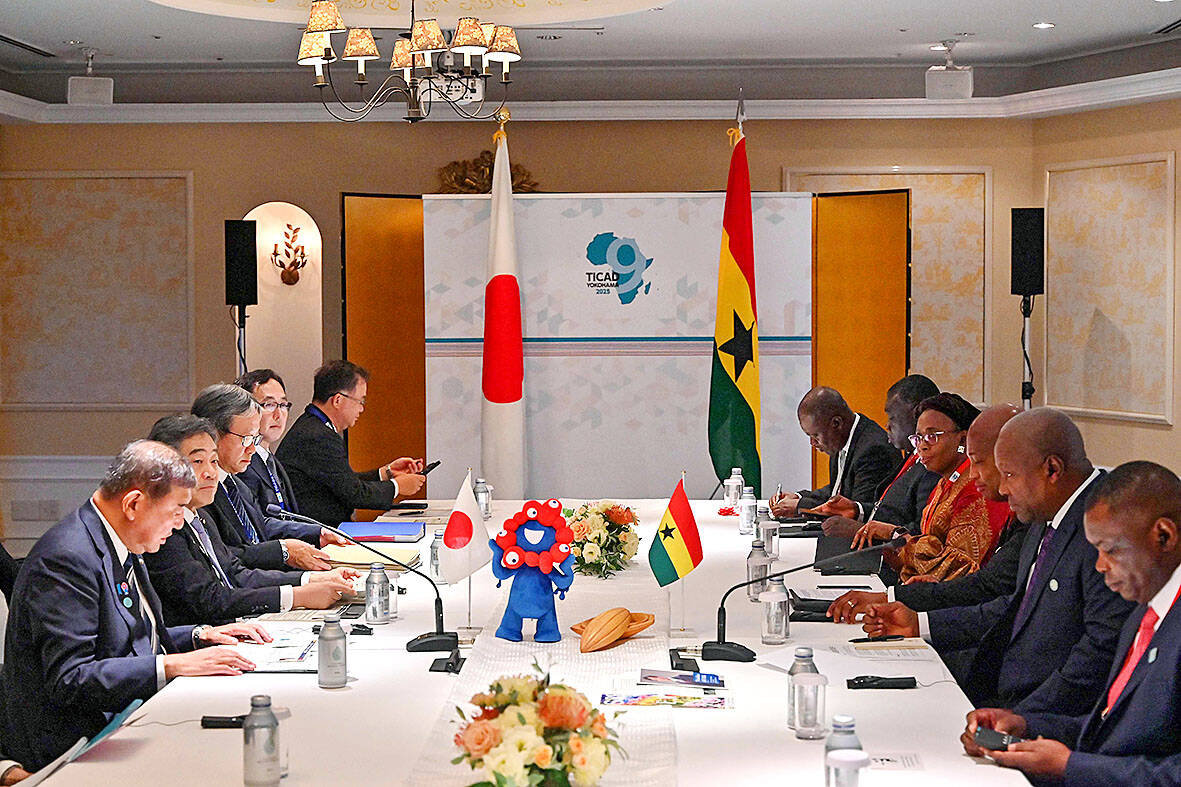An attempt to promote friendship between Japan and countries in Africa has transformed into a xenophobic row about migration after inaccurate media reports suggested the scheme would lead to a “flood of immigrants.”
The controversy erupted after the Japan International Cooperation Agency, or JICA, said this month it had designated four Japanese cities as “Africa hometowns” for partner countries in Africa: Mozambique, Nigeria, Ghana and Tanzania.
The program, announced at the end of an international conference on African development in Yokohama, will involve personnel exchanges and events to foster closer ties between the four regional Japanese cities — Imabari, Kisarazu, Sanjo and Nagai — and the African nations.

Photo: AFP
Media coverage in the four countries, and Japanese-language references to the articles, have been blamed for triggering an ugly backlash on social media in Japan, along with a wave of angry calls and e-mails to the Japanese cities’ offices.
Some critics appeared to believe that “hometown” status meant that people from the African countries would be given special permission to live and work in their Japanese partner cities.
“If immigrants come flooding in, who is going to take responsibility?” said one social media post.

Photo: AFP
One post on X claiming that Kisarazu was “seriously considering handing over the city to Africans” attracted 4.6 million views.
The four cities have received thousands of complaints from confused residents.
“Our team of 15 officials spent a whole day handling hundreds of phone calls and thousands of e-mails from residents,” an official in Sanjo told AFP.
The town has received 350 phone calls and 3,500 e-mails since Monday, the official said, while Imabari has fielded 460 calls and 1,400 e-mails from residents asking if the town had adopted a new immigration policy.
Japan’s chief cabinet secretary, Yoshimasa Hayashi, said the claims were baseless. “There are no plans to promote accepting immigrants or issue special visas,” he told reporters.
The cities also attempted to set the record straight. The mayor of Kisarazu, Yoshikuni Watanabe, pointed out that the city had hosted Nigerian athletes during the delayed 2020 Tokyo Olympic and Paralympic Games, adding that project would not lead to “accepting migrants.”
He added: “Our initiatives will involve cooperating in the education of young people based on discipline through baseball and softball, and it’s not a program that will lead to relocation or immigration.”
The mayor of Sanjo, Ryo Takizawa, said in a statement: “It is not true that the city has requested to accept migrants or immigrants from Ghana, and the city has no plans to make such a request in the future.”
Some attributed the outcry to an article in the Tanzania Times that carried the headline “Japan dedicates Nagai city to Tanzania.”
The word “dedicates” was translated on social media into the Japanese word sasageru, which could be interpreted to mean the town was being “sacrificed” to Tanzania, according to the Asahi Shimbun newspaper.
Nigeria’s government also appeared to have misunderstood the details of the program, describing Kisarazu as a location open to “Nigerians willing to live and work [in Japan]”. Japan’s government, it added, would create a special visa category for skilled people from the West African country.
Japan’s foreign ministry has reportedly asked the Nigerian government to issue a correction, while JICA said several media organisations had published articles containing “inaccuracies and potentially misleading information”.
“JICA is currently urging the relevant local media and the African government [sic] to promptly correct the inaccuracies contained in their coverage,” it said on its Web site.

Dissident artist Ai Weiwei’s (艾未未) famous return to the People’s Republic of China (PRC) has been overshadowed by the astonishing news of the latest arrests of senior military figures for “corruption,” but it is an interesting piece of news in its own right, though more for what Ai does not understand than for what he does. Ai simply lacks the reflective understanding that the loneliness and isolation he imagines are “European” are simply the joys of life as an expat. That goes both ways: “I love Taiwan!” say many still wet-behind-the-ears expats here, not realizing what they love is being an

Google unveiled an artificial intelligence tool Wednesday that its scientists said would help unravel the mysteries of the human genome — and could one day lead to new treatments for diseases. The deep learning model AlphaGenome was hailed by outside researchers as a “breakthrough” that would let scientists study and even simulate the roots of difficult-to-treat genetic diseases. While the first complete map of the human genome in 2003 “gave us the book of life, reading it remained a challenge,” Pushmeet Kohli, vice president of research at Google DeepMind, told journalists. “We have the text,” he said, which is a sequence of

Every now and then, even hardcore hikers like to sleep in, leave the heavy gear at home and just enjoy a relaxed half-day stroll in the mountains: no cold, no steep uphills, no pressure to walk a certain distance in a day. In the winter, the mild climate and lower elevations of the forests in Taiwan’s far south offer a number of easy escapes like this. A prime example is the river above Mudan Reservoir (牡丹水庫): with shallow water, gentle current, abundant wildlife and a complete lack of tourists, this walk is accessible to nearly everyone but still feels quite remote.

It’s a bold filmmaking choice to have a countdown clock on the screen for most of your movie. In the best-case scenario for a movie like Mercy, in which a Los Angeles detective has to prove his innocence to an artificial intelligence judge within said time limit, it heightens the tension. Who hasn’t gotten sweaty palms in, say, a Mission: Impossible movie when the bomb is ticking down and Tom Cruise still hasn’t cleared the building? Why not just extend it for the duration? Perhaps in a better movie it might have worked. Sadly in Mercy, it’s an ever-present reminder of just